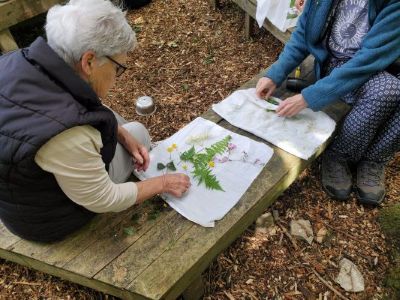Case Study: Outside Lives - Into the Woods
Authors(s), Creator(s) and Contributors: Anastacia Ackers, Evaluation Lead, Outside Lives
Publication Date: 15/12/2024
Categories: Case Studies
Partner(s): Outside Lives, Pendre Surgery, Mold, Betsi Cadwaladr University Health Board, Flintshire Mental Health Team, Flintshire Resilience Project (Youth Services), Sam Green, Nan Pickering
Funder(s): Arts Council Wales, Natural Resources Wales
Introduction
Into the Woods consisted of two pilot programmes that brought people together in a natural setting to connect with themselves, nature, and their community. Sitting under Outside Lives' wider ‘Sparc’ project (for people who need ‘a little bit extra at the moment’) participants, guided by skilled practitioners, engaged in a range of tailored, self-selected activities including storytelling, creative exploration, and communal meals. Taking place at Outside Lives' 4-acre site, the programme ran in three phases: Discovery (building relationships), Explore (diverse activity engagement), and Connect (solidifying bonds and opening future opportunities). Designed to promote well-being and community inclusion, it has supported participants in gaining confidence and pursuing new volunteer roles.
The Challenge
Into the Woods was developed as part of the wider Sparc project, and sought to reconnect people - to themselves, to nature and to community. We know that for many reasons, people can become disconnected from the wider world around them, and this project sought to bring about connection. Recognising that wellbeing is boosted both by being outdoors immersed in nature and engaging in creative activities, the project created a safe, inclusive space for participants to explore interests, build relationships and enhance resilience. Tailored to individual needs, the project emphasised flexibility, choice and sensory friendly approaches to creative practice and included transport for those who needed it and food for all participants.
The Approach
Working alongside creative practitioners Nan Pickering (writer, storyteller, facilitator) and Sam Green (woodland well-being and forest craft facilitator), we delivered two eight-week Into the Woods pilots at our 4-acre woodland HQ with 24 participants. The programme combined nature, creativity, and food, structured into three phases: Explore (trust and relationship building), Discover (pick and mix activities to deepen self-awareness and group connections), and Connect (focused on future opportunities and building on discoveries through follow-up sessions at our Discovery Hubs). Practitioners co-produced activities with participants, tailoring sessions to their interests and needs. Activities included storytelling (both oral and written), Hapa Zome printing, clay modeling, drawing, willow weaving, and more. Breakout spaces, such as woodland hammocks, were integral, enabling participants to engage at their own pace and comfort level. We collaborated with partners Flintshire Community Mental Health Team, Betsi Cadwaladr Health Board, Flintshire Resilience Project, and Pendre Surgery, to identify participants who would benefit most. Post-programme, we continue supporting participants on their well-being journeys through volunteering and tailored opportunities.
The Impact
We employed both qualitative and quantitative methods to comprehensively measure project outcomes and impacts. Our evaluation framework included the use of the Warwick-Edinburgh Mental Well-being Scale (WEMWBS) to assess participants’ well-being at the start and end of the project for participants of Pilot 2 alongside Theory of Change analysis to assess outputs and outcomes. We also collaborated with a counsellor post-project to gather insights on participants’ emotional responses and explore how their well-being evolved during and after the programme. From those surveyed across Pilot 1 and 2, we found significant increases in confidence, wellbeing and connection. WEMWBS scores demonstrate increases across all 7 areas of the scale. Participant feedback highlighted the value of co-produced activities, self-paced engagement, and the supportive, inclusive environment. All surveyed reported feeling more connected to themselves, nature, and their community.
Lessons Learned
Key learning from this project emphasised offering multiple activities alongside space for participants to engage at their own pace. The creative practitioners demonstrated responsiveness by implementing participant-suggested ideas into sessions. Including transport and food proved vital in removing barriers to participation, a practice we plan to embed in future projects. Going forward, we aim to introduce pre-project Discovery Conversations, including WEMWBS check-ins, to better understand participants and their needs.
The Legacy
The legacy of Into the Woods is clear in the life-changing impact it had on participants. One shared, "It really was a breakthrough for me... a life-changing experience to go into the woods." Many have gone on to volunteer and take part in other activities, building confidence and connections. The project’s success inspires plans for seasonal delivery and scaling up co-produced activities, while continuing to work closely with partners to keep the programme inclusive, impactful, and rooted in community needs.
Website and Social Media Links
https://www.facebook.com/groups/291385948111847
Contact Details
Anastacia Ackers discoveroutsidelives@gmail.com
Tags: Arts, nature, health, north east wales, denbighshire, storytelling, connection, wellbeing, resilience, mental health,

